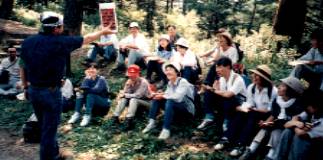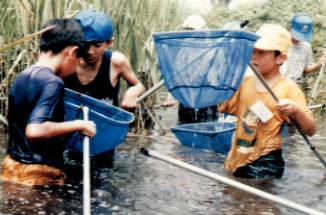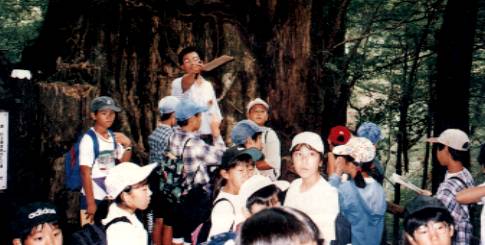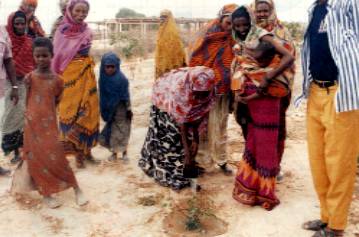Chapter I -3 :Quality of the Environment in Japan 1997
Chapter III : Promotion of Fundamental Environmental Efforts
2. Consolidation of a Social Base for Efforts
The Promotion of Environmental Education and Learning
The goals of environmental education and learning are not only to acquire knowledge about the environment. The more important thing is to nurture our ability to minimise the environmental load that is created in our lifestyles, being aware of the environmental implications of our own actions and utilising our acquired knowledge (Environmental Literacy).
In the United States, the National Environmental Education Act was set up in 1990, and various environmental education programmes have been developed by the Environmental Protection Agency acting as coordinating body for the efforts of many parties.
In Japan, the Basic Environmental Law that was established in 1993 states that the "promotion of education and learning regarding environmental conservation" is to be one of the major measures taken for conservation. Each individual takes an active role in the process of environmental education/learning. Environmental education/learning should be carried out as a form of life-long learning at every life-stage from childhood to adulthood and into old age, and should be conducted in various settings such as schools, homes, in the community and in the workplaces.
In order to solve environmental problems, it is extremely important for each person to continuously participate in environmental learning and conservation activities.
To support voluntary actions among citizens, organisations particularly national and local government bodies, have initiated positive support such as establishing citizens' activity bases, training leaders and making financial support.

Nature watch instructors training
Photo: Courtesy of Nagano Prefecture
Promotion of Environmental Learning for Children
Environmental education for children, who will lead the next generation, is especially important in that it deepens their understanding of the relationships that exist between human beings and the environment. Environmental education at this age also nurtures environmental consciousness and increases sympathy towards environmental issues.
The Environment Agency is supporting the activities of the Junior Eco-club, as well as supporting various other efforts that are being made in the school education system.
Promotion of environmental education for children does not mean leaving present environmental problems for future generations to solve. Present generations need to settle their negative environmental account, and hand a baton to future generations. The significance of promoting environmental education for children is to sustain the environment into the future.

Activities of the Junior Eco-Club

Children learning the history of the Yaku cedar trees
Photo: Courtesy of the Yakushima Environmental and Cultural Foundation

Eco-challenge Activities
Photo: Courtesy of the "Earth Watching Club Nishinomiya 2001"
Revision of the Environmental Impact Assessment
Environmental Impact Assessment is considered to be an important and effective method of preventing environmental deterioration and of building a sustainable society, and the need for environmental impact assessments is increasing rapidly.
The Government submitted the Environmental Impact Assessment Law Bill at the 140th Diet session in 1997, and the bill was approved on June 9 and became law.
Promotion of International Co-operation with Developing Nations
In developing nations, the human population has been increasing at an alarming speed, and environmental pressures are increasing correspondingly.
As a nation which has conquered some serious pollution problems in the past, Japan should share its experiences and technologies with developing nations. Rather than just telling them success stories, we should also share our past failures and explain the difficulties we faced putting past failures right, and explain the efforts that were made to conquer the problems. It is important to make sure that developing nations will not repeat the same mistakes.
Based on these ideas, international co-operation to build a technological base in developing nations administered by JICA and other agencies is promoted. In addition, the Environment Agency has been establishing international co-operation in the field of environmental monitoring.

The Japan-China Friendship Environmental Protection Centre
Photo: Courtesy of Japan International Cooperation Agency

Tree planting activities in Somalia with local participation
Photo: Courtesy of the African Education Fund International